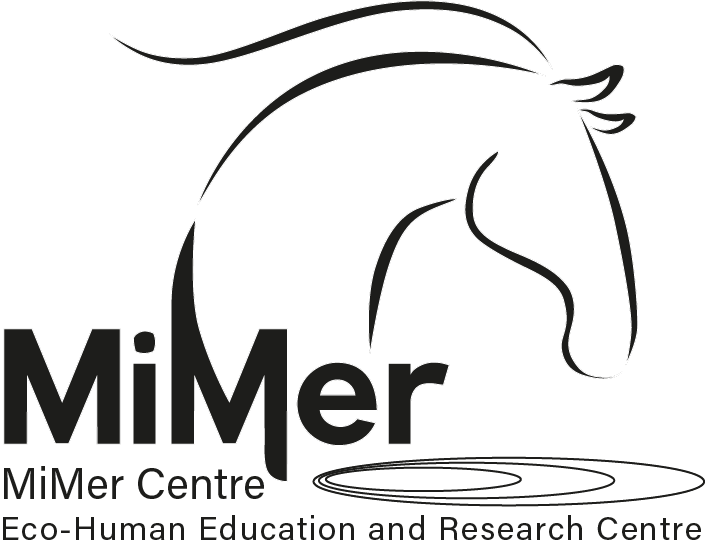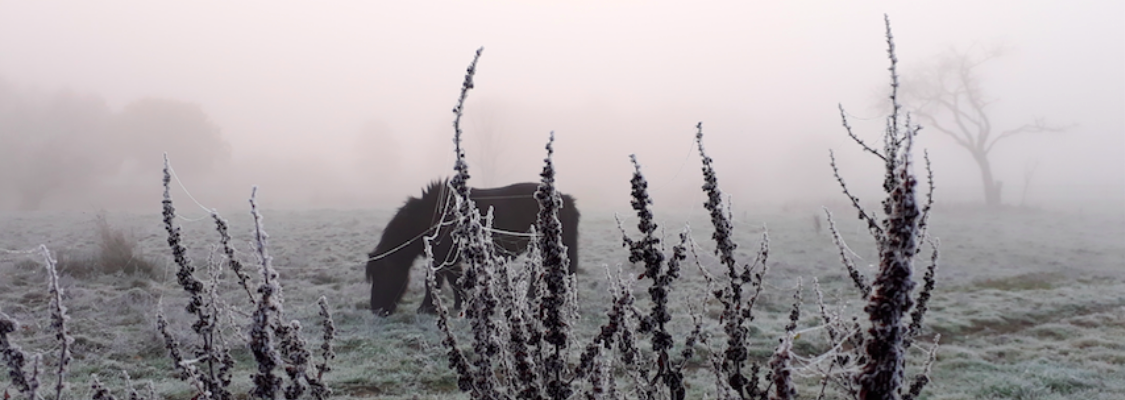Thoughts on rewilding and human-horse parallels
Here we are, at the doorsteps of winter, welcoming holiday season once again. Are we appreciating the seasonal cycles and changes that come along with it? Instead of performing the holidays, can we allow ourselves to literally rest and digest?
Ethics and welfare of equines touch us. We care. We study. We try our best to accommodate our hairy counterparts in our human environment. We begin to understand the natural needs of equines on different levels and find ways to facilitate the wild nature inside of domestication. We switch from single boxes to large pastures with friends. We let the horses run barefoot, ditch rugs and other debatable pieces of tack if we can. We question our way of interacting with the horses and learn other ways to connect and be together. Also, we understand that winter is coming and that the horses arrive at the season of preservation. They slow down, nature around slows down. Horses preserve their energy, and we allow them to do so. It is that time of the year after all, right?
All of that could be called small-scale rewilding. The dictionary definition for rewilding is "to protect an environment and return it to its natural state" or "to reverse the process of domestication". In this case, rewilding of domesticated horses (staying in domesticated environments) is indeed aiming to lessen the impact of domestication and manmade progression (or maybe regression?) reaching a bit closer towards nature itself. No, it is not about complete rewilding, but it is a step towards more compassionate treatment of horses and natural conditions where the animals have a chance to be more in tune with their own nature.
But do we practice what we preach in our own lives? As people who are passionate about equine welfare, shouldn't we also care about our own welfare, our own rewilding?
We are digging into the secrets of natural lives of equines while spending most of our time staying static inside of concrete blocks, forgetting the community around, staring only at manmade materials, falling into atrophy because we chose to place ourselves above the very nature of where we come from and who we are. Just like the horses kept in boxes for most of their time developing stereotypic behaviors and becoming reactive along with other "behavioral problems" (may that be the result of a mass-scale lifestyle problem?).
We constantly overdrive our own capacities because of our absurd reasoning. As if there would always be space for a little bit more, so we fill up our schedules to the extent that we forget ourselves. Just like the horses that are kept running in circles without understanding why.
We stuff our feet into unnaturally shaped shoes, become dependent on our gadgets while being on a diet that mostly consists of foods that are hardly trackable to their origin. We have aches and pains, and our heads could feel better too. Just like the horses who endure the unnecessary amount of steel shoeing, tacking up that disturbs their own regulation, movement, and wellbeing, that are fed with buckets of industrial feed few times a day regardless of their actual biological needs.
The parallels like these in equine and human lives continue on and on.
We remember to critically evaluate our horse's lives but are we forgetting our own human nature and its interrelatedness to rest of the natural world, including the horse's? Isn't that… a bit incongruent?
We have heavily domesticated ourselves. And no, we don't need to go back to being hunter-gatherers, but we can intentionally look at our current lives, make conscious choices to create more human conditions (in the animalistic sense) for ourselves.
We allow our horses to have a glimpse of rewilding and respect their seasonal cycles. Yet, we keep ourselves running around like headless chickens in panic, all year round, not really figuring out where we put our energy into until it's time to burn out. Do we fear of missing out? Can we turn the wheel and instead feel the joy of missing out? Because what can we miss out if we respect the nature inside of us, behind the curtains of our own domestication?
What about rewilding us along with the horses? In a way that critically evaluates the modern way of living, giving room for listening to ourselves and reversing our detachment from nature, connecting back to the interrelatedness of all. Would that enhance our ability to drive better welfare for horses as well? If we are holistically well, we are able to function in more optimal ways, sprinkling that wellness around.
Unfolding the layers of unavailing domestication in horses can inspire us to integrate elements of it to our own lives. Could all of that be part of our own rewilding? Critically evaluating what we are doing with our time, allowing the agenda-less moments to ourselves, like we have learned to have that with our horses in their process of rewilding. We can decide to consciously to preserve our energy. We can strive to tune in to the seasonal changes, cycles of life, respectfully.
So, let's do some rewilding together with our horses this Christmas, and greet the new year. It is the time of hibernation for many in the animal kingdom after all.
When you subscribe to the blog, we will send you an e-mail when there are new updates on the site so you wouldn't miss them.


Comments 4
Thank you, dear Sonia, for putting attention on topics that often seem to be forgotten. To raise our awareness that we are all interconnected, with the natural world, the animal kingdom etc. It is about time, indeed.
It was moving to read you. I am excited and grateful to hear more from your reflections and experiences of deep dedication and care.
I love this - thanks so much for bringing it to our attention. Now the question is how to implement our re-wilding and still earn a living to be able to care for our horses well?
And to also satisfy the social pressures we are exposed to - community, causes, family, friends and close relationships all demand our time and energy.
How do we balance or even do all that? - it's something I'm struggling with right now.
Thank you Cynthia! Keeping life balanced can indeed be a challenge, and the concept of rewilding should not become another thing to accomplish/to cause additional stress. I think of rewilding in modern society to be a way which supports the obligations that one has (including the need to make a sufficient living). I believe the implementation of the ideas of rewilding to one's life is individual, depending on your situation. And maybe it helps to look at it as small steps, as in making small conscious choices that fit the busiest schedules, support the family, friends, and community around. Also, you can ask yourself honestly if there are any habits, routines etc. that could be changed, even just on a level of intention/presence, to support a more connected lifestyle. For example, adding a five-minute daily moment to "just being" with your surroundings fit even to a busy schedule. Starting small and seeing if that grows and expands from there. In the end, I believe, it is a lot about prioritization and finding out what it is that makes you feel good, and human, while still managing the everyday obligations (maybe all of the believed obligations actually aren't obligations?)
Thanks Sonja, I appreciate your reply and yes, small steps will help